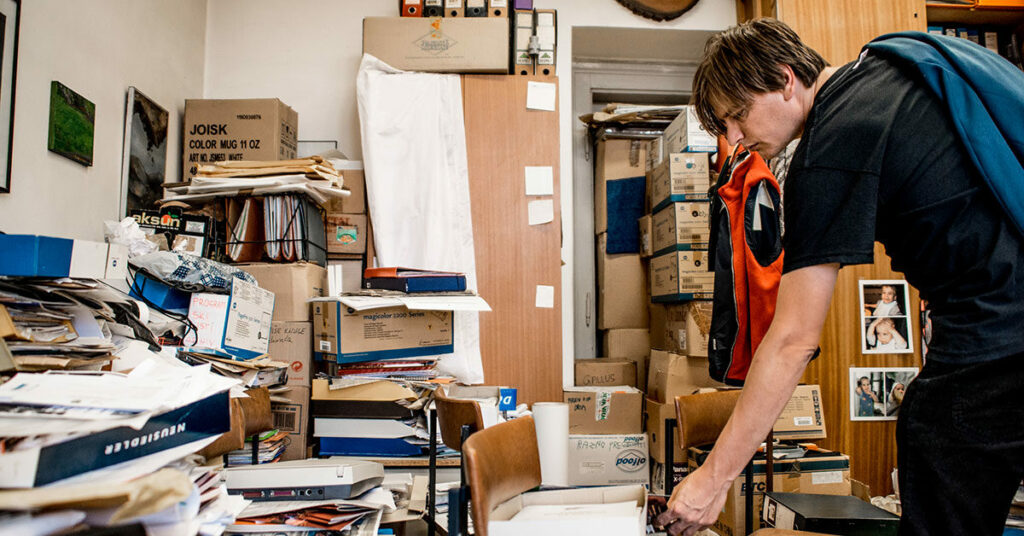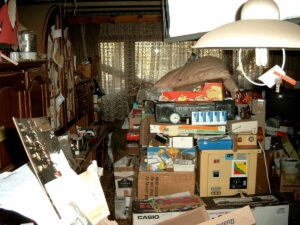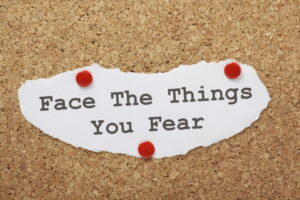Hoarding is a disorder that can have a serious impact on your life. If you are worried that you or someone you know may be suffering from hoarding, it is important to get help as soon as possible. This guide will teach you everything you need to know about diagnosing and treating hoarding.
Contents
Hoarding: Meaning And Symptoms

Hoarding is the persistent difficulty of discarding or parting with possessions because of a perceived need to save them. A person with hoarding disorder experiences distresses at the thought of getting rid of their belongings, even if those things are useless or harmful. The common symptoms include:
- Excessive acquisition of items, even if they’re unnecessary or unwanted
- Difficulty discarding items
- Disorganization and clutter in the home
- Persistent thoughts and anxiety about possessions
- Inability to use living spaces as intended because of clutter
Diagnosis Of Hoarding 
Many individuals with hoarding disorder do not go to a doctor, but rather for other problems such as depression or anxiety. A mental health practitioner uses a psychological exam to determine if you have a hoarding disorder. You may also be asked about any particular habits that might contribute to compulsive collecting and saving of items, which leads to a discussion of hoarding.
If you decide to see a mental health counselor, he or she may want to speak with your family and friends. Cluttered living spaces and storage areas are frequently photographed and filmed in order to assist. You could also be questioned about whether you have any symptoms of additional mental diseases.
Getting Ready For Your Appointment
Your doctor may recommend a mental health specialist, such as a psychiatrist or psychologist, that has expertise in diagnosing and treating hoarding disorder if you or someone you care for displays indications of this condition.
If you’re dealing with challenges in your relationship, it’s critical to find out what mental health treatments are available and how they may aid you. You might want to first meet with a mental health expert to develop a plan for discussing your issues with your loved one. A mental health professional can help you prepare for a conversation, ensuring that your loved one gets the treatment he or she needs.
Your loved one will almost certainly need assurance that no one is going to enter his or her home and start tossing things out if you think about the option of getting help. Here’s some information to assist a person with hoarding disorder symptoms in preparing for their initial consultation and understanding what to anticipate from the mental health professional.
Here is some to-do list that you can follow in order to have an effective hoarding diagnosis:
Make A Note Before Your Consultation 
- Give as much detail as possible about the nature of your symptoms, when they started, and how long they’ve been present. It will assist the mental health professional in determining what kinds of things you feel compelled to preserve and personal beliefs regarding acquiring and keeping objects.
- Consider if you have ever encountered difficulties when attempting to manage your stuff.
- Highly sensitive personal information, such as traumatic events or losses in your past, such as divorce or the death of a loved one.
- All of your medical records, including any new physical or mental health issues you’ve been found to have.
- The composition and dosage of all medicines, vitamins, supplements, or other herbal treatments you take.
You Can Ask Some Questions 
If at all possible, ask a trusted family member or friend to go with you. Bring pictures and videos of cluttered residences and storage areas to make the assessment more personal.
You should also go through the following questions with your mental health professional:
- Is there a possibility that my symptoms indicate something serious? Why?
- Do you believe I require therapy?
- What treatments are most likely to work?
- How quickly will my symptoms respond to therapy?
- How long will it take for my symptoms to get better?
- How often will I need therapy sessions, and how long will each one last?
- Is there anything I can take to assist?
If you have any other questions, don’t be afraid to ask them during your appointment.
Anticipate From Your Mental Health Counselor 
To understand how hoarding disorder is affecting your life, your mental health professional may request:
- What are the most common things you buy?
- Do you avoid discarding items?
- Do you avoid making judgments about your clutter?
- Do you often decide to acquire or keep objects you don’t have space for or aren’t using?
- How would you feel if you had to get rid of some of your stuff?
- Is there a lot of stuff cluttering up your home that makes you unable to utilize rooms for their intended purpose?
- Do you find that clutter prevents people from visiting your home?
- How many dogs, cats, or other animals do you have? Are you able to provide suitable care for them?
- Have you attempted to clear up the mess on your own or with the help of friends and family? How effective were your efforts in accomplishing that goal?
- Have your family members expressed an interest in cleaning up the mess?
- Do you have any mental health issues right now?
What Solutions Can Be Given After Diagnosis?
Therapies
Most individuals with hoarding disorder are uneducated about the detrimental impact of hoarding on their lives, or they don’t believe they need treatment. This is especially true if the items or animals provide comfort. People will frequently react with irritation and fury when their belongings or pets are taken away, quickly gathering additional to meet emotional needs.
The most common therapy for hoarding syndrome are:
Cognitive behavioral therapy
CBT may help people with hoarding disorder by helping them to identify and challenge the thoughts and beliefs that contribute to their hoarding behavior. For example, a person with hoarding disorder may believe that they need to keep every item they come across because it might be useful someday. CBT can help this person learn to question this belief and instead focus on choosing which items are truly necessary.
CBT can also help people with hoarding disorder develop better organizational skills and ways of dealing with difficult emotions. For example, people with hoarding disorder may benefit from learning how to sort and declutter their belongings using specific methods.
Exposure and response prevention (ERP) 
ERP is the most effective psychological treatment for hoarding disorder. It involves gradually exposing yourself to the things you’re afraid of (triggers) and learning not to respond with compulsive behaviors (coping mechanisms).
For example, let’s say you’re afraid of throwing away anything that might be useful. So, you keep old newspapers even though you never read them. In ERP, you would start by looking at pictures of old newspapers online. Then, you would work your way up to touching an actual newspaper for a brief period of time. Finally, you would progress to actually throwing away an old newspaper.
Acceptance and commitment therapy (ACT)
ACT helps the individual to accept their hoarding behavior and commit to making changes in their thinking and behavior. The therapist will help the individual to set realistic goals and develop a plan to declutter their home.
For example, the therapist may help the individual to identify their triggers for hoarding and work on ways to avoid or minimize these triggers. The therapist may also help the individual to learn how to let go of items that they are attached to.
Medications 
There are presently no drugs approved by the Food and Drug Administration (FDA) for treating hoarding syndrome. Antidepressants are typically used to treat other ailments such as anxiety and depression, which frequently accompany hoarding syndrome.
Selective serotonin reuptake inhibitors (SSRIs) are one of the most popular kinds of antidepressant medications.
Parents May Be Advised To Take care Of Kids 
It’s critical for parents of children with hoarding disorder to be involved in their treatment. Some parents may believe that allowing their child to accumulate and save numerous things will help relieve their child’s anxiety over time. Actually, it might exacerbate tension.
Parents must obtain expert assistance along with their child’s therapy in order to master how to respond to and support managing their child’s hoarding condition.
Parents may help their kids by
- coaching their child to let go of unneeded items
- helping them develop organizational skills
- teaching them how to reduce anxiety
- modeling healthy behaviors
- providing support and encouragement
Hoarding is a serious problem that requires professional treatment. If you or someone you know is struggling with hoarding, don’t hesitate to reach out for help.
Suggestions For Self-Care Tips
The mental health professionals may provide you with some self-coping solutions as well. There are a few things that may help you in this regard:
Keep up with personal hygiene and bathing
Maintain good personal hygiene when you suffer from hoarding disorder. This means regular bathing, washing your hair, and cleaning your teeth.
You should also wear clean clothes every day. In addition to taking care of your hygiene, it is also important to keep your living space clean. A clean environment will help you feel less anxious and stressed, and it will be easier to find things that you need.
Eat a nutritious diet
Eating a healthy diet can improve mood and energy levels. It helps boost mood and gives people the energy they need to tackle their hoarding. Second, a healthy diet can improve focus and concentration. It will make it easier for you to declutter or work on other tasks. Finally, it can help you feel help better physically and mentally, making it easier to manage your condition.
Take care of yourself
Self-care is extremely important for people with hoarding disorder. It can help reduce anxiety, depression, and stress. It can also help promote a sense of well-being and increase feelings of self-worth and control. There are many different types of self-care activities that can be helpful for people with hoarding disorder. Some examples include exercise, hobbies, and socializing.
Take tiny steps
“Tiny steps” is a key phrase in helping those with hoarding disorder. It means breaking down the process of decluttering into very small, manageable tasks. The goal is to slowly but surely make progress, without feeling overwhelmed by the task at hand.
The key is to start small and gradually increase the amount of time you’re willing to spend on decluttering. So if you’re not sure how to diagnose hoarding, start by taking tiny steps. It’s the best way to make progress without feeling overwhelmed.
Conclusion
Hoarding is a mental disorder that a professional can diagnose well. If you or someone you know may be hoarding, don’t hesitate to get help from a mental health professional.
After a diagnosis is done, an individualized treatment plan is created. It includes medication, cognitive-behavioral therapy, medications, and self-coping strategies. The aim of the treatment is to reduce the symptoms of hoarding and improve the quality of life.
Never try to force someone with hoarding disorder to get rid of their things. This can be very overwhelming and can make the situation worse. The tiny steps will lead to big changes and progress in time. Make sure you are patient and understand that this process takes time.
Professional Guidance is the first step to moving toward your healing journey. You can try reaching Therapy Mantra to seek expert help in the comfort of your own home. Our therapists will help you get a solution to manage and overcome your problem. You can book your online therapy and talk directly to your assigned mentor. You may also download our free OCD treatment app on Android or iOS.











